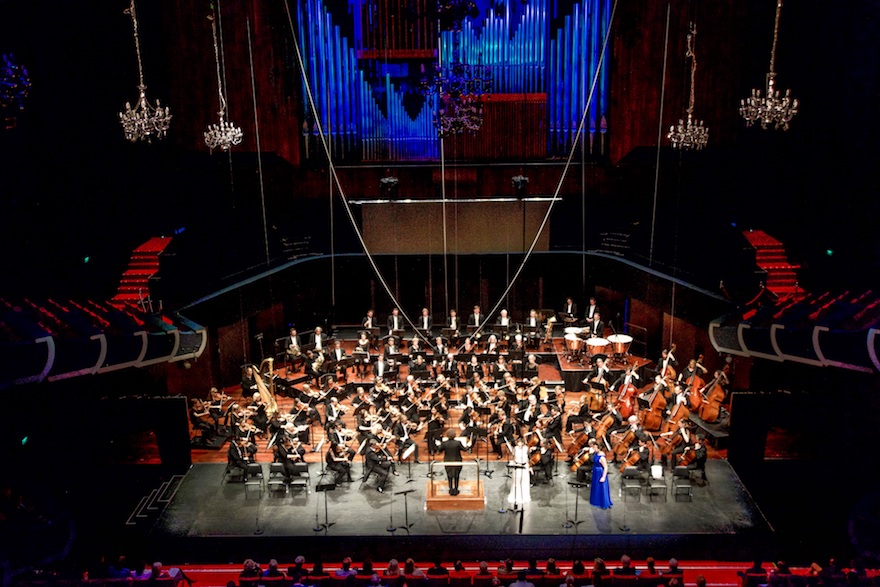Review: West Australian Symphony Orchestra, Tristan und Isolde by Richard Wagner ·
Perth Concert Hall, 16 August ·
Review by Jonathan W. Marshall ·
Wagner wrote Tristan und Isolde for performance as a fully staged opera in a theatrical venue. Taking staging ideas for a recital performance from the Tasmanian Symphony Orchestra’s 2016 production, West Australian Symphony Orchestra Principal Conductor Asher Fisch has moved all of the orchestra’s instrumentalists out of the pit and onto the modest stage of the Perth Concert Hall. As with the TSO, this forces nearly everything else off. The singers perform alarmingly close to the strings, which gives them the appearance of being yoked into an inhuman, monstrous machine. Where Wagner wanted his music to act as an intangible supra-human force that billowed through and into his cast, performer Gun-Brit Barkmin, as Isolde, seemed almost poked and prodded by the physical instruments themselves, as each frenzy of bowing seemed to ratchet up her corporeal and vocal tensions. As Robert Gibson explains in the program notes (cribbed from the TSO’s own notes), the singers are “enmeshed within the ‘endless melody’” of the orchestral performance to a degree rare in opera.
As with the TSO, the recital staging meant that the chorus could not fit on the Perth stage either. Repeating an accidentally comic moment from the TSO production, there is a point where a rear wall panel of the Concert Hall opens to reveal an awkward cluster of singers trying to unobtrusively lean into the venue.
Fisch’s decision to follow the TSO, therefore, could have benefitted from a rethink, especially as critics of the TSO production do record some slightly jarring details (see www.limelightmagazine.com.au). Nor does the staging or venue of the Perth Concert Hall always present the work at its best. From my seat, the reed instruments sometimes interacted strangely to produce a low-level kazoo rasp.
Even so, the unusual staging choices sometimes produced superlative acoustic and spatial effects. The opening sailor’s ballad, performed, Wagner tells us, “as if from the masthead,” was sung powerfully off stage, and so boomed into the auditorium in a ghostly, puzzling manner, thereby affecting the audience much as it did Isolde, who asks who it is who mocks her from out of the mists? The remarkably simple device of having Tristan for the first time move from his position stage left to join Isolde stage right created a wonderful coming together of the lovers, not only in terms of music, but also the acoustics of the venue, their voices quite literally nestling side by side. This was further dramatised by Bragäne, Isolde’s maid, suddenly appearing behind us and leaning out from the upper stalls to warn them to “Beware!” The rich, wooden tones of the horn that announces the coming conclusion of the protagonists’ dramas and woes was also voiced from off stage, its unplaceable call producing an eerie sense of foreboding.
Musically and vocally, moreover, the performers were in extremely fine form. It was satisfying that WASO had assembled the full range of bass cellos which Wagner calls for, and Fisch went one better than the TSO by presenting Perth with the complete operatic score, rather than the abridged version.
Tristan begins as a reserved character, and performer Stuart Skelton perhaps overdid this to produce a rather colourless Tristan in Act I. In the later duets, however, he let loose in full roaring voice, and his combination of passion and rich tone was gorgeous. Ain Anger, as Tristan’s liege lord King Marke, was nothing short of phenomenal, an extremely carefully measured basso profundo in which each enunciation was sustained right through to the closing consonants. Ekaterina Gubanova, as Bragäne, and Boaz Daniel, as Tristan’s right-hand-man Kurwenal, did not get much to work with, initially, but as the tragedy unfolded each had ample opportunity to prove just how good they are.
In the end, though, the production belonged to Barkmin. Isolde has to move from bitter vengeful hatred to ecstatic love, intense mourning, and then (when the edgy, unresolved chords of the entire four-hour performance morph into an explosive sustained B major chord) into an otherworldly joy at the prospect of moving beyond all of this to join her love in a timeless realm. Barkmin achieved this both vocally and expressively. Dropped shoulders, urgently grasping hands, ringed-in-arms: she used her body to ramp her energies up, down and through a vast array of states. No wonder she looked drained after each act.
WASO’s Tristan und Isolde had a few rough edges, but the orchestra and collaborators more than rose to the challenge of mounting this tremendous live version, in full, creating a welcome and unique opportunity for Perth audiences. Congratulations to all.
Tristan und Isolde will be performed again 19 August, 2pm-7pm at Perth Concert Hall.
Pictured top is Gun-Brit Barkmin, as Isolde. Photo: Andy Tyndall.

Like what you're reading? Support Seesaw.






